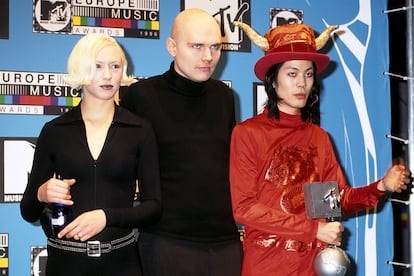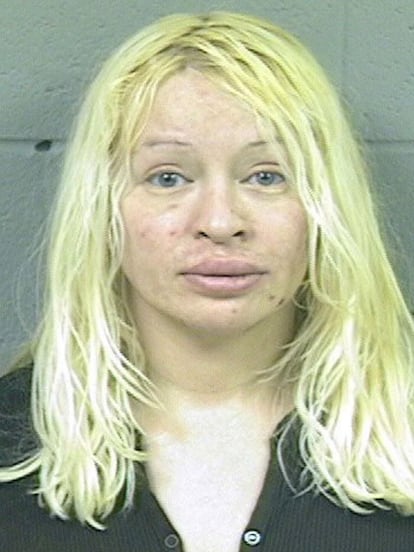Why The Smashing Pumpkins’ bassist disappeared without a trace
Iconic bassist D’arcy Wretzky, perhaps the coolest musician of the 1990s, hid from the public for two decades after being accused of being a ‘bad-spirited drug addict’ by the band’s leader. Despite the harsh accusations and her prolonged silence, Wretzky’s departure from the group was not the way it was reported

Rolling Stone magazine maintained that “for a large part of the female population of the 1990s, there was no cooler esthetic in the world than theirs.”
The statement, which referred to The Smashing Pumpkins, wasn’t simply hyperbole or clickbait. With black tinted lips, headbands displaying devil horns, pale complexions, golden bob cuts and skinny, wiry figures, the group of musicians – led by Billy Corgan – was called “the band with the most psychologists’ bills in the world.”
For an entire decade, The Smashing Pumpkins packed stadiums, becoming the most glamorous and deified outsiders of alternative rock. However, one afternoon in 1999, the group announced the sudden dismissal of their guitarist, citing uncontrollable drug addiction. She disappeared without a trace. Almost 20 years later, during a reunion of the band’s original quartet, D’Arcy Wretzky showed signs of life again. Retired from music, she was living on a farm, training horses and practicing martial arts. She claimed to be “much healthier and in better shape” than any of her former bandmates. And she also took the opportunity to tell her truth about one of the most bitter, controversial and prolonged feuds that ever took place on the music scene.

Reconstructing a story never fully told by its protagonists is an arduous task. But to discover the first tensions between the members of the band and their bassist, we must go back to 1992. That year, D’arcy Wretzky and James Iha — the co-founder of the group — put an end to a four-year-long romance that began during the band’s meteoric rise. The guitarist thus lost her emotional support. Her relationship with Corgan had been conflictive from the start, as he recruited Wretzky only after getting into a heated argument with her during a concert. “We never had a cordial relationship. He was always throwing his tantrums and I [was always] laughing at him. When James scolded me [for laughing], I answered, ‘Who died and made him God?’”

Wretzky played bass for The Smashing Pumpkins during their first five albums, which catapulted them as a generational band that managed to fill stadiums in just a few hours with tens of thousands of young people dressed in black. During their world tour, another traumatic event occurred: keyboardist Jonathan Melvoin died from a heroin overdose in New York, in the company of drummer Jimmy Chamberlin. Chamberlin was subsequently kicked out of the band — he had already fallen unconscious during several of the tour’s concerts due to his extreme addiction. Corgan claims that, before performing in Lisbon, they had to inject a dose of adrenaline into Chamberlin’s heart. “Like in Pulp Fiction,” he confirms, evoking the scene in which Vincent (John Travolta) ‘resurrects’ Mia (Uma Thurman).
Chamberlin would be admitted back into the band three years later to be part of the recording of the album Machina/The Machines of God. This album, however, would be Wretzky’s last. Without even finishing the scheduled sessions, Billy Corgan fired her abruptly, claiming that she was “a bad-spirited drug addict who refused to seek help.” A few weeks later, the bassist was arrested after police found a gram of cocaine in her car during a search. She was replaced by bassist Melissa Auf der Maur — a friend of Wretzky — who played on the subsequent tour and appeared in a couple of music videos for the album’s singles, until the band announced its dissolution in 2000.

It was much later, in 2018, when the return of The Smashing Pumpkins with the original trio (Corgan, Iha and Chamberlin) was announced. Then, the news about a hypothetical return of D’arcy Wretzky forced the artist to come out of her self-imposed exile. After accusations were thrown around regarding who was to blame, the bassist took the opportunity to — once again — denounce the band leader’s messianic ego and clarify the reasons which led to her dismissal. Wretzky assures that her silence was an attempt at allowing her wounds to heal. However, 25 years later, that desire seems impossible.
“Getting into the studio with the band was always a fucking nightmare. It was horrible. I was so stressed that I had a miscarriage. Not even the band knows this. It was traumatic,” she told the Alternative Nation music website. “Billy loved to humiliate and embarrass people in front of others. He was a bully and I was the only one who stood up to him. [But] I got to a point where I couldn’t fight anymore and I needed to leave.”
The toxic environment reported by the guitarist affected her emotional well-being, plunging her into a major nervous breakdown. “One day, I had 30 panic attacks. It was terrible. I tried to quit two or three times after the last tour, but it’s hard to do that when everyone — my husband (musician Kerry Brown), my family — is telling you to wait until the next album, saying that a lot of people’s jobs depend on you. Don’t just think about yourself. I should have left a couple of years [before I did].”
Wretzky has also denied the rumors that her drug addiction affected the dynamics of the band. She says that the first time she saw cocaine in her life was at the age of 27, when Marilyn Manson consumed it in the dressing room after one of his concerts.

D’arcy Wretzky also reveals the betrayal that her bandmates subjected her to, when they replaced her as the band’s bassist. During a three-month-long vacation — which was approved by the rest of the group after a tour — she was offered the possibility of making her film debut starring in a movie alongside Mickey Rourke. The producers even raised the possibility of Melissa Auf der Maur also appearing in it and urged Wretzky to contact her friend.
When her bandmates found out about the project, they became “furious” and urged her to return to the group immediately. “I was told that Billy thought that if [I] was well enough to make a movie, I was healthy enough to return to the studio. But he never called me — he always made someone else do it.” The bassist also interpreted the fact that Auf der Maur never responded to her call about participating in the film as a sign that her colleagues had already spoken to her about replacing Wretzky in The Smashing Pumpkins. She claims that the alleged concern about her addiction was simply an excuse to facilitate her expulsion.

None of Wretzky’s statements have been denied by Billy Corgan who, on the other hand, never denied his authoritarian leadership. “It was never a democracy,” he once told EL PAÍS.
In the last 20 years, Wreztky has only made the headlines once, when, in 2011, she was arrested for failing to appear at a court hearing. The musician-turned-farmer was denounced for the commotion caused in a nearby town by a pair of horses that escaped from her ranch. While she has received several proposals to join other bands and return to the studio, she claims to be satisfied with her current life.

Sign up for our weekly newsletter to get more English-language news coverage from EL PAÍS USA Edition
Tu suscripción se está usando en otro dispositivo
¿Quieres añadir otro usuario a tu suscripción?
Si continúas leyendo en este dispositivo, no se podrá leer en el otro.
FlechaTu suscripción se está usando en otro dispositivo y solo puedes acceder a EL PAÍS desde un dispositivo a la vez.
Si quieres compartir tu cuenta, cambia tu suscripción a la modalidad Premium, así podrás añadir otro usuario. Cada uno accederá con su propia cuenta de email, lo que os permitirá personalizar vuestra experiencia en EL PAÍS.
¿Tienes una suscripción de empresa? Accede aquí para contratar más cuentas.
En el caso de no saber quién está usando tu cuenta, te recomendamos cambiar tu contraseña aquí.
Si decides continuar compartiendo tu cuenta, este mensaje se mostrará en tu dispositivo y en el de la otra persona que está usando tu cuenta de forma indefinida, afectando a tu experiencia de lectura. Puedes consultar aquí los términos y condiciones de la suscripción digital.









































